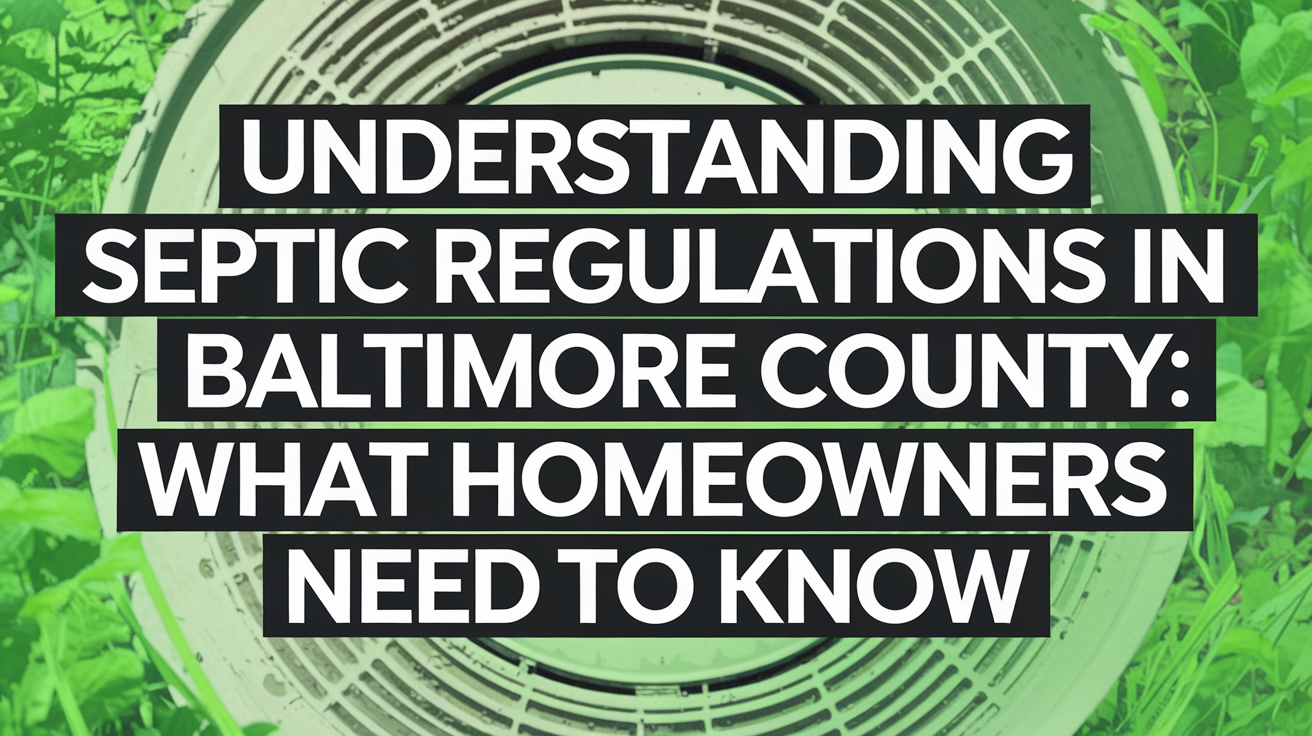As a homeowner in Baltimore County, it’s crucial to understand and comply with local septic regulations to protect your property, your family’s health, and the environment. Failing to adhere to these regulations can result in costly repairs, legal issues, and potential health hazards. In this article, we’ll provide an overview of Baltimore County’s septic regulations, covering permitting, installation, maintenance, upgrades, and environmental considerations.

Section 1: Permitting Process
Before installing a new septic system or making significant changes to an existing one, homeowners must obtain a permit from the Baltimore County Department of Environmental Protection and Sustainability (EPS). The permitting process involves:
- Submitting a site plan and soil evaluation
- Passing a percolation test to assess soil suitability
- Providing detailed system design plans
- Paying applicable permitting fees
The permitting process typically takes 4-6 weeks, and fees can range from $500 to $1,000 or more, depending on the complexity of the project. Working with a licensed septic contractor can help streamline the permitting process and ensure all required documentation is submitted correctly.
Section 2: Installation Standards
Baltimore County has specific requirements for septic system installation to ensure proper function and protect public health and the environment. These standards include:
- Minimum setbacks from property lines, wells, and water bodies
- Approved tank materials and sizes based on household occupancy
- Proper drain field sizing and construction
- Use of licensed contractors for installation
During installation, the EPS will conduct inspections to verify compliance with local standards. Homeowners should ensure their contractor is familiar with Baltimore County’s requirements and obtains necessary approvals before beginning work.
Section 3: Maintenance Requirements
Regular maintenance is essential for keeping septic systems functioning properly and preventing costly repairs. Baltimore County requires homeowners to:
- Have their septic tank pumped every 3-5 years by a licensed contractor
- Keep records of pumping and maintenance for at least 3 years
- Address any system malfunctions or failures promptly
Failing to maintain a septic system can lead to fines, legal action, and potential health hazards. Homeowners should familiarize themselves with their system’s maintenance needs and schedule regular service to ensure compliance with local regulations.
Section 4: Upgrading Existing Systems
In some cases, existing septic systems may require upgrades to meet current standards or accommodate changes in household size or water usage. Reasons for upgrading may include:
- System age or failure
- Expansion of living space or increased occupancy
- Changes in local regulations
When upgrading a septic system, homeowners must work with a licensed contractor and obtain necessary permits from the EPS. Options for upgrading may include:
- Replacing the tank or drain field
- Installing an alternative treatment system
- Connecting to a public sewer system, if available
Baltimore County offers financial assistance programs, such as low-interest loans, to help homeowners with the cost of septic system upgrades. Consult with the EPS to learn more about available resources and eligibility requirements.
Section 5: Environmental Considerations
Properly functioning septic systems play a critical role in protecting Baltimore County’s water resources and public health. Failing or poorly maintained systems can contribute to:
- Groundwater and surface water contamination
- Nutrient pollution in the Chesapeake Bay
- Spread of waterborne illnesses
To minimize environmental impacts, Baltimore County encourages homeowners to:
- Conserve water to reduce strain on septic systems
- Avoid flushing non-biodegradable items or harsh chemicals
- Plant only grass or shallow-rooted plants near the drain field
- Participate in local watershed protection initiatives
By following best practices and complying with local regulations, homeowners can help safeguard the environment and ensure a healthy future for Baltimore County.
Conclusion
Understanding and adhering to Baltimore County’s septic regulations is essential for homeowners to protect their properties, their families, and the environment. By familiarizing themselves with permitting requirements, installation standards, maintenance obligations, upgrade options, and environmental considerations, homeowners can ensure their septic systems function properly and comply with local guidelines.
If you have questions about septic regulations or need assistance with your system, consult with licensed septic contractors and the Baltimore County Department of Environmental Protection and Sustainability. By working with local experts and staying informed about your responsibilities, you can maintain a safe, efficient, and compliant septic system for years to come.

